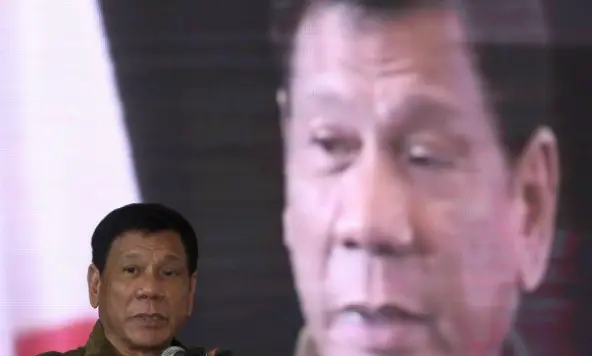Rodrigo Duterte has banned the media from covering his presidential inauguration tomorrow – a first in the Philippines’ recent history and something journalists fear will signal restrictions on freedom of information.
The public has also not been invited for the first time to personally witness the oath taking of a new president since democracy was restored in 1986.
Instead, all 14 cameras scattered inside Malacañang Palace’s Heroes Hall for the swearing in will be manned by state television PTV4. Broadcasters will pick up the feed, which will also be live-streamed by the social networking site Facebook, Presidential Communications Office Secretary Martin Andanar confirmed to the South China Morning Post.
President Benigno Aquino takes his oath in 2010 in Rizal Park, Manila. Photo: AP
Normally the grand scale event is open to the public and media in Rizal Park, Manila.
Andanar said he was able to negotiate with the organising committee that accredited television media would be permitted to use the palace lawn for piece-to-camera footage, instead ofoutside the palace gates. The rest of the media will be corralled in two separate palace buildings far from the event and will watch the ceremony on large screens.
Duterte’s relations with the media sank when, during a June 5 press conference, he was grilled about wolf-whistling a female journalist and he issued controversial statements on media killings. After that, Duterte announced he would not give interviews until the end of his term.
Philippines' president-elect Rodrigo Duterte speaks to journalists in Davao City. Photo: AFP
Andanar, a former broadcast journalist, called the strained relations a mere tampuhan or misunderstanding: “Let’s wait and it will go back to normal,” he said.
“Just like any relationship, I believe it undergoes a process of healing. I think the direction is a very vibrant media relationship between the president and the commercial media.”
Reporters are sceptical about Duterte’s ban on interviews by the media after he granted one-on-one access to Mocha Uson, a raunchy dancer and staunch supporter, for her Facebook page.
Mocha Uson, the model who interviewed Duterte for her Facebook page. Photo: SCMP
In the video clips that Uson posted on Facebook, Duterte hurls expletives about the media and names a media magnate who he said had offered him a bribe in exchange for obtaining a permit to operate in Davao City.
The incoming president’s ban on media at the venue for his inauguration that has sent ripples of concern throughout the industry.
TV5 anchor Ed Lingao, said the message was clear: “We don’t need media. We only need social media and we only need government media.”
Lingao, who has reported from Afghanistan and Iraq, said: “The only information media will get is the information that government wants to release. Given that situation, you cannot ask questions, you cannot interview people, you cannot challenge assertions by people in power.
“How can you be the watchdog when you are not even in the house. If you’re not part of information gathering, what’s your role?”
Another veteran journalist who did not want to be named said the new arrangement could have a positive result: “When you shut the gates [of Malacañang] we will learn to work harder for our stories.”
Andanar denied that the presidency was sending the media a message. He said there was simply no room to accommodate all media organisations.
In fact, he added, Duterte had ordered him “to fix the channels of information ... between departments and the entire government so we may light the dark cornersof government”.
(SOUTH CHINA MORNING POST)
 简体中文
简体中文

